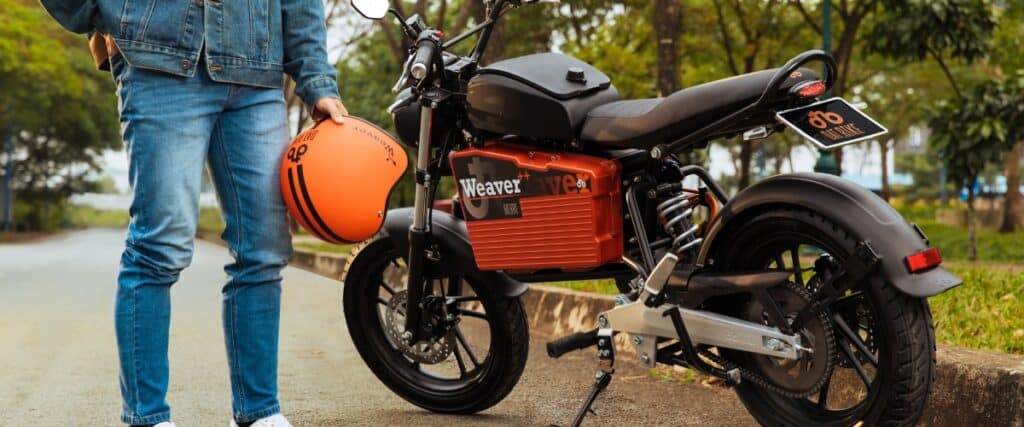GreenTech entrepreneur Son Nguyen is the founder and CEO of Vietnam’s first homegrown electric motorcycle startup, Dat Bike. The eco-warrior is determined to bring revolutionary reform to transportation in the region and sat down with Hive Life to share his vision to expand electric vehicle adoption in the region while building a circular transit system with his carbon-efficient e-bikes.
In 2019, Silicon Valley-based software developer, Son Nguyen, made a transformative career shift, leaving his high-paying job to bring sustainable reform to his home country, by establishing Vietnam’s first electric motorcycle startup, Dat Bike. Envisioning a greener future for the local transit ecosystem, Son began his journey to facilitate the mass adoption of eco-friendly transportation nationwide. Disrupting the nation with his carbon-neutral two-wheelers, Dat Bike has caught the attention of various global investors, who have labelled their substantial growth as “a testament to an electric future.”

Dat Bike’s vehicles are domestically-manufactured and are designed by their in-house team of industrial specialists. By bringing production back home, the startup aims to lower high-purchasing costs, and improve efficiency, as well as the accessibility of EVs in the region, appealing to the wider population.
On a mission to “convert the next 250 million people” from gasoline to electric vehicles (EV) in SEA, eco-entrepreneur and trailblazer Son shares his vision of accelerating his efforts to “greenify the transportation ecosystem,” while replicating his “e-bike success” in other markets to advance mass adoption across the globe.

Can you introduce us to Dat Bike?
We started four years ago to [mitigate carbon-emissions] by moving people from gasoline two-wheelers to electric vehicles, not only in Vietnam, but across Southeast Asia, with a mission to convert over 250 million people.

What was your role before founding Dat Bike?
I started programming back in school, and [had] participated in various competitions representing Vietnam, [acquiring] a government-sponsored scholarship to study computer science in the United States. I [then went on to receive] my master’s degree and started my career at Microsoft.
I later moved to a high-frequency trading company to explore more, worked on the optimisation of their system, and later shifted to a wealth management software [firm], to help pension and hedge fund [executives] manage their portfolio.
I later realised that those things did not matter to me, and that I would never be the user of the software that I built. I want to define myself not as a “tool user,” but as a problem-solver. With that in mind, I started with an [issue] that was relevant to people I knew, to make a [real impact].

Why did you launch Dat Bike in Vietnam?
Working in Silicon Valley, I would visit my family back home and see how fast cities in Vietnam develop. Many people [were] moving into [urban areas], which led to an increased [adoption of] motorbikes, [worsening] air pollution.
In the West, EV technology has been developed to a point where people can [easily] move away from gasoline, but there is no real market for two-wheelers in the region.
However, in Southeast Asia two-wheelers [present] a big market [opportunity], [which appealed to me] on a personal level. I wanted to combine the technology in the West with the market [demand] in the East- to make an impactful EV model.

What unique value were you hoping to bring to Vietnam’s transportation system through your company?
Vietnam lacked a product that served the needs of the [local population]. We [wanted to] build vehicles that are compelling enough to convert people from gasoline to electric to solve that problem.
If we look at companies that are competing in this market, some of them focus solely on design, while others emphasise utility features, all of which are secondary. While these are to some point necessary, they are not as important as making a [high-functioning bike]. [We wanted to ensure] that performance is as good as a gasoline motorbike, [while taking] power range, charging speeds, and more [into consideration].

Can you highlight some key features of your electric bikes?
From the consumer perspective, we provide the best value, meaning that you get [optimal] performance over price ratio, with better charging time, and higher speed.
For specific features, we offer around 200 kilometres of range for only three hours of charging which is the fastest compared to other e-bikes on the market.
Can you share more about your distinct design approach?
Our design [approach] is not for the mass consumer. The street bike model is [distinctly constructed] for the local Vietnam market, around 15% of the share– gasoline and electric combined, as compared to the actual scooter market, which is much bigger.
[Additionally], we plan to replicate our success from street bike design to a scooter model soon.

Who are your major clientele?
Our current customers are early adopters, from ages 28 to 45, with almost 91% of them from higher-than-average income groups. Up to 40% of them have a personal vehicle, such as a car or a motorcycle, with e-bikes being their secondary vehicle.
Our goal is to not only convert a few people, but every single person in Southeast Asia to be part of EV [adoption]. [Hence], we will soon expand our [product range] to target more consumers.
What sets Dat Bike apart from other EV models produced in the region?
To define a good product, [we consider the] performance versus price ratio. [In the EV market], it does not matter if you are [manufacturing] bikes, cars, trucks, or even trains- whichever model you decide to work on, you need to make sure it is just as good and feasible compared to the other gasoline vehicles.
We are working towards offering a good e-bike that is also affordable, [which is the] first major difference between Dat Bike and other [EV companies] in the market.
The second difference is related to how consumers focus on the status of products. They are not only [considering] the current price, but are also looking at [how fast its valuation will appreciate over time].
While it may take us longer to [consolidate] a functional bike, [since our production is local], we can improve on it easily by [optimising] our technology. So far, Dat Bike has helped save millions of tonnes of CO2, with the number of two-wheelers we have [on the road].

How would you describe Vietnam’s transportation ecosystem in terms of sustainability?
The Vietnamese government has decided that by 2040, the country will [halt the production and import] of gasoline motorbikes and cars, with a transitioning plan [in place]. The EV market will become more crowded with this laid out, [while] giving Vietnam a national advantage.
Vietnam [is expected] to be the next China in the region, with strong manufacturing [capabilities] especially in technology and electronics, given its geographical advantage.
We have also [shown great potential] in becoming the market leader in motorcycle manufacturing. One of the biggest reasons why we rely on the Vietnamese supply chain is because we want to iterate faster with supply, as speed of change [significantly] matters. As an EV company, Dat Bike will need to establish itself fast before it starts to get competitive.

What are some of the major challenges faced by Dat Bike in facilitating mass adoption?
The first would be the perception that EVs would be cheaper and of much lower quality than gasoline.
When we first started, most people would ask why electric vehicles are more expensive, or why our e-bikes are more pricey compared to any other motorcycles. Since we were established, there has been [a major focus] on education and product [development].
We then have another problem with the resale value, which is less of an issue in Vietnam as compared to Indonesia, where the majority of people would buy a bike based on financing from banks [or other sources]. Hence, these products need to have a high [valuation] for reselling.

What strategies have you adopted to tackle these issues?
If we have more players on the street, the valuation [for our product] would be higher, which would lead to more people buying e-bikes.
In my perspective, we need to build a “high-quality bike,” and target more niche groups of consumers, where we can build better relationships, who [in retrospect would] [help] advertise for us. [Working closer] with our customers is our [key] strategy.
What does your 5-year plan look like to help facilitate the global shift to greener modes of transportation?
We want to be the motorcycle company of SEA. The markets for Vietnam, Indonesia, Thailand, and the Philippines, [for instance], are quite similar, in terms of consumer lifestyle.
We believe that Vietnam has an advantage, [with regards to our] manufacturing and engineering expertise, as well as a [consolidated] supply chain to help support us on our mission.

With Dat Bike’s 2022 funding round closing at US$8 million, could you tell us more about the growth opportunities this has opened up for your company?
The EV industry needs plenty of capital to [make its mark] and [tackle various industry-related] problems. This is a stepping stone for our future expansion.
We generated a [great] demand, and [upon] finishing the round, we raised [sufficient] working capital, which will allow us to expand our production and machinery capacity.
We [will also] invest in building new designs that will replicate our success from existing models, which we will announce soon. You can expect that [our latest] bike will set a new standard for the industry.

Moving forward, what does the future look like for Dat Bike?
We have one of the fastest developments of technology in SEA. For instance, we [produce] a new model every year, which is normally not the case for traditional gasoline motorcycle manufacturers. Our goal for the near future is to utilise our tech platform to build [a diverse range of] bikes that will target multiple market segments.
[Further into the] future, we [anticipate] building a manufacturing plant in each of these countries, to [create more] efficiency throughout the process.
My vision for newer cities in Asia is that, while there will be public transportation, [individuals can also own] vehicles, which are smaller, greener, and more fuel and space-efficient.
How can interested parties purchase their first electric bike?
You can go to our website, [purchase the bikes] and get them delivered to your home. We also have three stores in Vietnam you can visit in person and pick up from as well.

Related Articles
APAC’s Rising Young Entrepreneurs Driving Climate Change Solutions
Vietnamese Architecture Firm VTN Architects is Building Greener Cities





